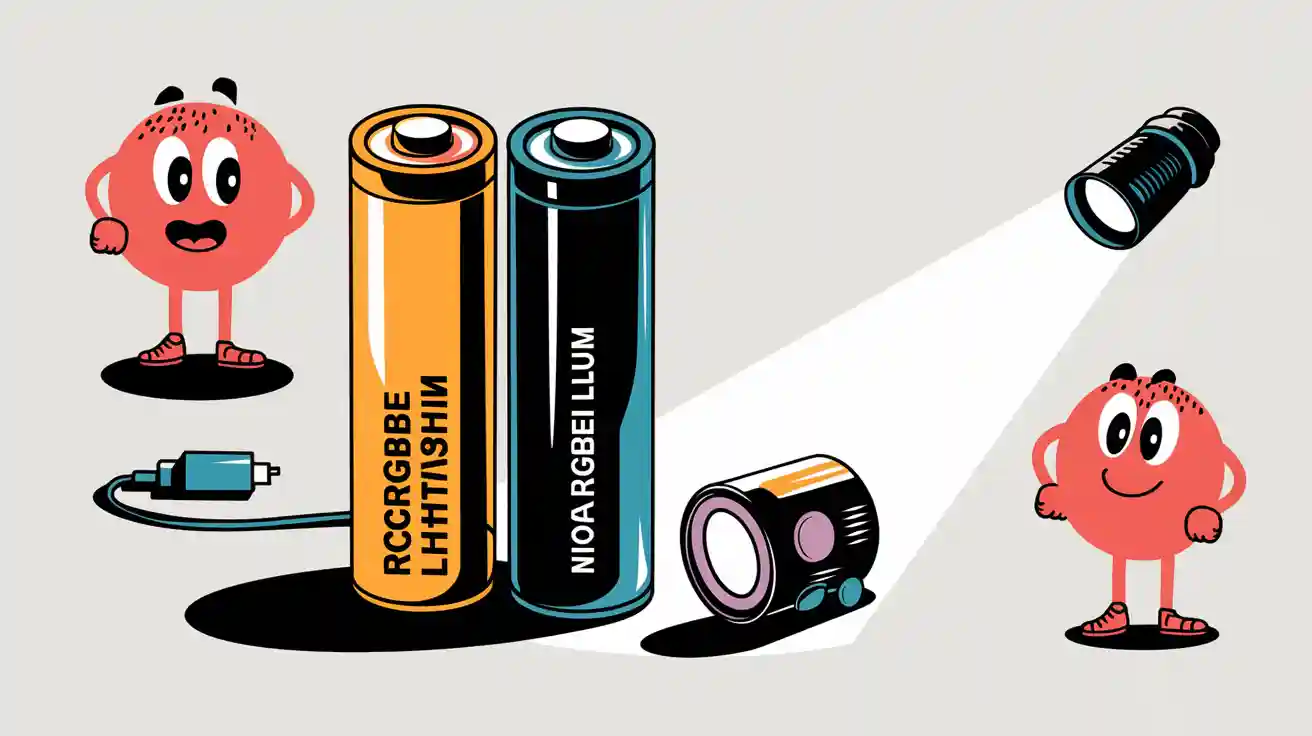Contents

When it comes to powering smoke detectors, lithium batteries stand apart as the superior choice. Their extended lifespan minimizes the need for frequent replacements, saving you both time and effort. Unlike traditional batteries, a smoke detector lithium battery delivers consistent power, ensuring your device operates reliably when it matters most. By upgrading to this advanced power source, you enhance safety and reduce maintenance demands, creating a worry-free environment for years to come.
📌 Pro Tip: Prioritize lithium-powered smoke alarms to enjoy long-term reliability and peace of mind.
Key Takeaways
Lithium batteries can work for 10 years, aligning with the 10-year lifespan of many modern smoke detectors, so you replace them less often.
Using lithium batteries in smoke alarms makes them safer. They give steady power, even in very hot or cold weather.
Long-lasting lithium batteries help the environment by creating less waste and supporting green habits.
Part 1: Key Benefits of Smoke Detector Lithium Battery

1.1 Long Lifespan and Reduced Maintenance
Lithium batteries are engineered to last up to 10 years, aligning perfectly with the average lifespan of smoke detectors. This extended battery longevity eliminates the need for annual replacements, a common requirement for traditional alkaline batteries. By choosing lithium-powered smoke alarms, you significantly reduce maintenance efforts and avoid the inconvenience of frequent “low battery” chirps that disrupt your daily routine.
🔧 Note: Lithium batteries, such as LiFePO4, are designed for durability and consistent performance, making them a dependable smoke alarm battery for long-term use.
Key Advantages:
10-Year Lifespan: Matches the operational life of most smoke detectors.
Minimal Maintenance: Reduces the need for frequent checks and replacements.
Enhanced Convenience: Eliminates interruptions caused by dying batteries.
1.2 Elimination of Frequent Battery Changes
Traditional smoke alarm batteries often require replacement every six months to a year, creating unnecessary hassle and increasing the risk of neglect. In contrast, 10-year sealed battery smoke alarms are designed to operate for a decade without needing battery changes. This innovation ensures uninterrupted home safety and reduces the likelihood of fire risks caused by inactive smoke detectors.
📌 Pro Tip: Opt for lithium batteries to eliminate the burden of frequent replacements and focus on other aspects of home safety.
1.3 Consistent Power Supply Over Time
Lithium batteries provide a stable and reliable power source for smoke detectors. Their high energy density ensures consistent performance, even under heavy usage. Unlike traditional batteries, lithium batteries exhibit low self-discharge rates, allowing them to retain their charge for extended periods. This reliability is crucial for maintaining the functionality of smoke alarms, especially in critical situations.
Comparative Data:
Feature | Description |
|---|---|
High Energy Density | Lithium-ion batteries store a large amount of energy in a compact size. |
Cycle Life | Long lifespan ensures efficient power delivery over time. |
Low Self-Discharge | Retains charge longer when not in use, ensuring reliability. |
Low Maintenance | Requires minimal upkeep, enhancing convenience. |
Lifespan | Typically lasts around 10 years, reducing maintenance needs. |
By leveraging lithium batteries, you gain peace of mind knowing your smoke detectors will operate reliably throughout their lifespan. This consistent power supply is especially beneficial in extreme temperatures, where traditional batteries often fail to perform effectively.
✅ Callout: Lithium batteries, including LiFePO4, are recognized for their reliability and safety features, making them the ideal choice for smoke alarm batteries.
Part 2: Safety and Reliability of Lithium Batteries in Smoke Alarms

2.1 Reduced Risk of Battery Failure
Lithium batteries significantly reduce the risk of battery failure in smoke alarms, ensuring your home safety remains uncompromised. Unlike traditional alkaline batteries, lithium batteries maintain a stable voltage output throughout their lifespan. This stability ensures that your smoke detectors operate reliably without sudden power drops.
The design of lithium batteries used in smoke alarms also minimizes overheating risks. These batteries are sealed and non-replaceable, which eliminates potential hazards associated with improper handling or installation. Furthermore, their 10-year lifespan aligns with the operational life of most smoke detectors, reducing the frequency of battery changes and the risk of dead batteries.
✅ Tip: Choose 10-year sealed battery smoke alarms to eliminate the hassle of frequent replacements and ensure consistent performance.
2.2 Enhanced Performance in Photoelectric Smoke Alarms
Photoelectric smoke alarms rely on dependable smoke alarm batteries to detect slow-burning fires effectively. Lithium batteries provide the consistent power supply needed for these alarms to function optimally. Their high energy density and low self-discharge rates ensure that the alarms remain active and responsive over time.
Interconnected photoelectric smoke alarms, which link multiple devices for comprehensive coverage, benefit greatly from lithium batteries. These batteries support the interconnected system by delivering reliable power to each unit, ensuring seamless communication between alarms. This feature enhances your safety by providing early warnings in case of fire, even in large or multi-story homes.
📌 Pro Tip: Upgrade to interconnected photoelectric smoke alarms powered by lithium batteries for enhanced fire detection and improved home safety.
2.3 Dependability in Extreme Temperatures
Lithium batteries excel in maintaining reliability under extreme temperature conditions. Energizer® Ultimate Lithium™ batteries, for instance, operate effectively in temperatures ranging from -40ºF to 140ºF. This capability ensures that your smoke detectors remain functional in both freezing winters and scorching summers.
Traditional batteries often fail in such conditions, compromising the safety of your home. Lithium batteries, however, ensuring uninterrupted protection regardless of the environment. Their robust performance makes them the ideal choice for smoke detectors installed in attics, basements, or other areas prone to temperature fluctuations.
🔧 Note: For dependable smoke alarm battery performance in extreme conditions, lithium batteries are the most reliable option.
Part 3: Cost-Effectiveness and Environmental Benefits of 10-Year Smoke Alarm Battery

3.1 Regulatory and Industry Standards about Smoke Detectors
Safety Compliance:
Organizations like the National Fire Protection Association (NFPA) and European standards (e.g., EN 14604) recommend a maximum lifespan of 10 years to ensure reliability. Some countries mandate expiration dates on products.Manufacturer Testing:
Manufacturers use accelerated aging tests to simulate long-term use and validate alarm functionality within the 10-year timeframe.
Switching to 10-year sealed battery smoke alarms offers significant financial advantages. While the initial cost of lithium-powered smoke detectors may seem higher, their extended lifespan and reduced maintenance costs make them a more economical choice over time. Traditional smoke alarm batteries require frequent replacements, which can add up in terms of both cost and effort.
By investing in 10-year lithium batteries, you gain long-term value and worry-free protection. These batteries align with the average lifespan of a smoke alarm, ensuring continuous protection without the hassle of frequent replacements.
📌 Tip: Opt for long-life lithium ion batteries to enjoy enhanced safety and a superior level of protection while reducing overall costs.
3.2 Reduced Waste and Eco-Friendly Design
Lithium batteries contribute to sustainability by minimizing waste. Frequent replacements of traditional smoke alarm batteries generate significant waste, which impacts the environment. In contrast, 10-year battery powered alarms reduce the number of discarded batteries, supporting eco-friendly practices.
Many lithium batteries, including LiFePO4 Lithium batteries, boast high recyclability rates, often exceeding 95%. This eco-friendly design ensures that fewer materials end up in landfills, promoting a greener future. Choosing sealed battery smoke alarms powered by lithium batteries not only enhances safety but also supports your commitment to environmental responsibility.
🌱 Note: Learn more about sustainability initiatives and how lithium batteries contribute to eco-friendly solutions here.
3.3 Contribution to Sustainability Goals
Upgrading to 10-year lithium batteries aligns with global sustainability goals. These batteries reduce your carbon footprint by lowering the frequency of replacements and waste generation. Their long-lasting design ensures continuous protection while supporting efforts to combat climate change.
Lithium batteries also avoid the use of conflict minerals, ensuring ethical sourcing practices. This commitment to sustainability and ethical production makes them a responsible choice for smoke alarm batteries.
By choosing 10-year sealed battery smoke alarms, you not only protect your home from fire hazards but also contribute to a cleaner, greener planet. This decision reflects a superior level of protection for your family and the environment.
🔧 Pro Tip: For customized lithium battery solutions tailored to your needs, visit Large Power Custom Battery Solutions.
Lithium batteries provide unmatched advantages for smoke detectors, ensuring dependable safety and peace of mind. Their 10-year lifespan reduces maintenance, while advanced features enhance reliability. By upgrading to lithium-powered smoke alarms, you gain long-term cost savings and support sustainability goals.
Benefit | Description |
|---|---|
Long Battery Life | Lithium batteries last up to 10 years, providing dependable safety. |
Enhanced Safety Features | Features like split-spectrum technology reduce false alarms by 99%. |
Peace of Mind | Users experience less frequent battery replacements, ensuring consistent performance. |
For customized lithium battery solutions tailored to your needs, visit Large Power Custom Battery Solutions.
FAQ
1. Why are lithium batteries better than alkaline batteries for smoke detectors?
Lithium batteries last up to 10 years, while alkaline batteries require frequent replacements. Their stable voltage ensures reliable performance, even in extreme temperatures.
🔧 Tip: Upgrade to lithium-powered smoke alarms for long-term safety and reduced maintenance. Explore options at Large Power Custom Battery Solutions.
2. Can lithium batteries handle extreme temperatures in smoke detectors?
Yes, lithium batteries like LiFePO4 perform reliably in temperatures from -40ºF to 140ºF. This makes them ideal for attics, basements, or other challenging environments.
🌡️ Note: Lithium batteries outperform traditional options in extreme conditions, ensuring uninterrupted protection.
3. How do lithium batteries contribute to sustainability?
Lithium batteries reduce waste with their 10-year lifespan and high recyclability rates (up to 95%). They align with global sustainability goals by minimizing environmental impact.
For customized lithium battery solutions tailored to your smoke detector needs, visit Large Power Custom Battery Solutions.





